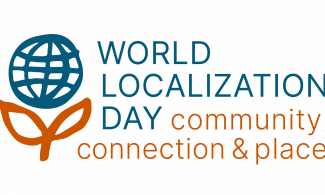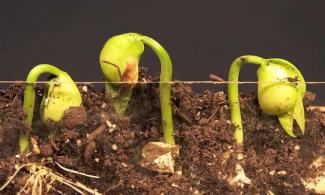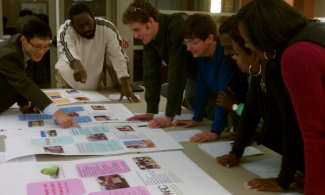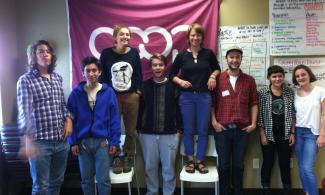
A beautiful and potent paradox
Across the world, a quiet revolution is emerging. Countless grassroots groups, civil society organizations and individuals are coming together to forge a more hopeful path to the future: away from the destructive global consumer culture, towards healthy communities grounded in strong local economies.
From farmer’s markets and community gardens to local business alliances, community land trusts and ecovillages, initiatives have taken off on every continent to reweave the fabric of local interdependence with others and with the land. What’s more, this is happening despite policies that overwhelmingly favor corporations and global supply chains.
To celebrate and strengthen this inspiring movement, World Localization Day was launched on June 21st, 2020. In its first year, people tuned into the program from 172 countries. In 2021, 80 organizations hosted events in 30 countries, on six continents. World Localization Day 2022, builds on these efforts - not just on the day itself. For the entire month of June, groups and organizations across the world will be shining a light on localization as a strategy for systemic change. There will be online and in-person events - from talks, debates and workshops to local food feasts, festivals and community celebrations.
The campaign has garnered the support of prominent figures, including H. H. the Dalai Lama, professor Noam Chomsky, environmentalist Jane Goodall, social commentator Russell Brand, journalist Naomi Klein, author and activist Vandana Shiva, and psychologist Gabor Maté.
Recent crises have highlighted the need for greater regional self-reliance. From the blockage of the Suez Canal to the Covid pandemic and the war in Ukraine, it is becoming clear that dependence on global supply chains is risky, especially when it comes to basic needs. Meanwhile, the climate crisis demands an immediate shift away from a resource-intensive, polluting global economy – the same economy responsible for the unconscionable gap between rich and poor.
In this context, localization–a way of bringing the economy home – is a systemic way to address our most pressing global problems.
Local food systems in particular demonstrate a powerful ‘solution-multiplier’ effect. They produce fresher, healthier food and local markets stimulate diversification on the farm, which leads to greater productivity and biodiversity. They enable farmers to transition away from chemical-intensive, monocultural production for export. They create meaningful livelihoods, rebuild community, and even help treat depression. In the words of Naomi Klein, “local food economies are essential for restoring our health and the health of the planet as a whole.”
There’s also a political component to the local food movement: civil society organizations like La Via Campesina and the Asian Peasant’s Coalition – representing hundreds of millions of small farmers worldwide – are working towards food sovereignty, which entails more localized control of food production and distribution.
As World Localization Day makes clear, localization is about more than food. Community democracy initiatives and alternative education institutes are also a big part of the movement. So are local business alliances and local finance schemes that keep wealth circulating locally, rather than allowing it to be siphoned off to distant corporate headquarters.
Localization is also making waves in communities grappling with shocks – from pandemics to climate catastrophes. Especially since Covid, community mutual support groups have spontaneously arisen in almost every country – from Brazil to Australia to Indonesia. In many cases, these community groups are proving to be much more responsive and nimbler than centralized agencies in dealing with crises. They also encourage the best human qualities like compassion and altruism, galvanize community solidarity and lift people’s spirits in ways that cannot be achieved by large-scale organizations. Even in the context of devastation and hardship, people have felt uplifted and inspired thanks to the displays of community support and care. All of these examples show us how much we have to gain by decentralizing or localizing our economies.
Wherever you look, things are happening at the local level that testify to the goodwill at the core of human nature. Community responses to the covid pandemic illustrated this perfectly, but even before covid, the number of people actively engaged in volunteering for civil society organizations was estimated to be over 350 million. They prove that there are other ways forward for our future– ways that are superior to the conventional path of ‘progress’ through consumer capitalism.
Localization goes beyond changing our personal behaviour: it’s about making structural shifts in the economy at a macro level.
“To embark on a systemic path of localization, we need to redirect economic support to favor the local over the global, instead of the other way around,” explains Helena Norberg-Hodge, convenor of World Localization Day. “If we can bring about policy shifts, we will see healing, regeneration and transformation more quickly than most of us dare to imagine.”
Therein lies the beautiful and potent paradox of the global movement for localization.
For more information, and to get involved, visit www.worldlocalizationday.org
INSPIRING EXAMPLES FROM AROUND THE WORLD
Samsø
Denmark
On Samsø, the world’s first island powered by 100% local, renewable energy, success rests on a high level of community ownership and buy-in: more than half of the island’s 21 wind turbines are owned by local farmers, and the entire community collectively decided on the placement of the turbines. Three of the island’s four heating plants run on leftover barley straw purchased from the island’s farmers, and the fourth uses local woodchips and a solar hot water system.
https://unfccc.int/climate-action/un-global-climate-action-awards/climate-leaders/samso
Sambhavna Clinic
Bhopal, India
In 1984, thousands died when a plant owned by US multinational Union Carbide released a vast cloud of lethal gas into the city of Bhopal. Hundreds of thousands were left permanently injured and still today suffer an ongoing health catastrophe, as a handful of pharmaceutical corporations pounced on this new “market” for their products.
5 years ago, a small local trust chose to break the cycle of poison by using ancient plant remedies to treat the modern industrial diseases engulfing Bhopal. In time, they created a model of effective community health intervention. Sambhavna Clinic, ecologically constructed and nestled in a 1-acre medicinal herb garden, offers free medical care to the survivors through a combination of Western medicine, traditional Ayurvedic medicine, and yoga.
https://sambhavnabhopal.org/about-sambhavna/
Seongmisan Ecovillage
In Seoul, South Korea
At the foot of a small, wooded hill in northwest Seoul, lies an ecovillage called Seongmisan. Seongmisan began with a community-run childcare centre, and grew with the struggle to protect the Seongmi hill from an industrial development. Since its beginnings, this urban village has organically expanded outwards, adopting more and more households, and quietly contributing to a transformation of values and economic structures. By 2014, Seongmisan had grown to involve an impressive 700 households and 20,000 people, as well as 70 businesses such as organic food cooperatives and restaurants, a small theatre, an ecological soap producer, two alternative schools, and even a dental practice. All these institutions embody a radical departure from modern consumerism, instead prioritising collaboration, mutual responsibility, short and accountable supply-chains, sustainability, and face-to-face connection.
In a megacity like Seoul, Seongmisan is an oasis of calm, bringing to life a more beautiful future. It is just one of over 10,000 ecovillages across the world that, together, form the Global Ecovillage Network.
Unión de Cooperativas Tosepan
From food to buildings, medicine to finance
Cuetzalan, Mexico
Tosepan is a network of cooperatives with 35,000 members spread across 430 villages in the lush, cloud-forested Sierra Norte mountains of Puebla, Mexico. Tosepan is dedicated to constructing a holistic, sustainable, locally- and democratically-controlled economy rooted in indigenous culture and knowledge.
Tosepan’s three civil associations and eight cooperatives cover a wide spectrum of basic needs. Organic staples like corn, beans and vegetables, as well as crops like coffee, pepper, and sugarcane, are grown on agroecological farms for community needs and local markets. Natural building – using local resources like bamboo and adobe – incorporates features like water harvesting, solar dehydrators, ecological cookstoves, and renewable energy. Local healthcare focuses on prevention and traditional herbal remedies. Decentralised renewable energy aims for total energy sovereignty. A local cooperative bank supports the functioning of the entire ecosystem of cooperatives.
https://www.facebook.com/tosepan.titataniske.1/
https://localfutures.medium.com/uni%C3%B3n-de-cooperativas-tosepan-58f9d96086ec
Bhoomi College
An education in interconnection
Bangalore, India
Just outside Bangalore, known as the information technology capital of India, lies an oasis inviting people to explore a different way of life. Bhoomi College brings together thinkers and practitioners in fields like local food and farming, holistic and place-based education, green energy, trade policy, sustainable water systems, and more, to teach year-long graduate degree programs in Sustainable Living and Holistic Education as well as a large number of shorter courses. Bhoomi also hosts a repair café – a meeting space where people come together to mend broken household objects, resisting throwaway culture – as well as a farmer’s market, a small farm, and an array of events, from talks about the climate crisis to tree plantings and monsoon celebrations.
Growing Communities
London, UK
‘Growing Communities’, based in Hackney, London, take a whole-systems approach. They operate a much-loved, 100% organic and biodynamic farmers’ market, as well as urban farms, agriculture education programs, and a box scheme. They focus on shortening supply-chains, supporting climate- and nature-friendly food production, boosting profits for farmers, and making fresh, local food more affordable and accessible. They have been going strong for 25 years, and – aside from all the social and ecological benefits – studies have found their model to be much more efficient than industrial agriculture.
“Research shows that … people who buy food from us do eat more seasonally, eat more portions of fruit and veg and less meat, waste less food and appreciate and understand where food comes from.”
Julie Brown, Director, Growing Communities
https://growingcommunities.org/
Mountain Roots Food Project
Gunnison (Colorado), USA
In the high-altitude meadows of Gunnison Valley, Colorado, Mountain Roots Food Project runs an array of projects to strengthen resilient food systems, including:
- A small farm
- A multi-farm Community-Supported Agriculture (CSA) program, featuring farmers from around the region
- Community gardens where members work together and share the harvest
- School garden and nutrition education programs in public schools
- A “food rescue” program, connecting food-insecure families with excess produce from backyard gardens and farms.
https://www.mountainrootsfoodproject.org/
Deccan Development Society
Andhra Pradesh, India
Working across 70 villages in Central India, the Deccan Development Society (DDS) has supported tribal women in forming groups to establish sovereignty over their seeds, food, farming, health, markets, and media.
DDS has created its own seed banks, millet processing units, local food outlets, and restaurants, providing a powerful network of support for women entrepreneurs. They have even taken control of the market, by pushing the state government to redirect public subsidies away from mass-produced rice and wheat, and towards their indigenous, climate-adapted, nutrient-rich, organic crops. Women treasure these crops more than monetary wealth. Consequently, seeds are neither bought nor sold, but always exchanged. By taking back control of their seeds, lands, and markets, they have escaped the volatility of corporate-run markets and maintained vibrant communities and agrarian cultures, and reclaimed self-reliance and self-respect.
Today, more than 5,000 women have adopted millet-based agrobiodiverse farming approaches and conserved almost 100 indigenous seed varieties, which have proven much more resilient to drought. The women also operate their own radio station, produce many documentaries to raise awareness about food security issues and to celebrate their own culture, and they have even started their own school – which they built out of local, natural materials.
“Every month you get your salaries and fill your pockets with currency notes. But come to my home. I have filled it with seeds. Can you match me?”
Paramma, from Khasimput village
http://www.ddsindia.com/www/default.asp
https://www.facebook.com/Deccan-Development-Society-785099524902651/
Cooperativa Integral Minga
Montemor-O-Novo, Portugal
Located in the small rural town of in Portugal, this cooperative was founded to reverse the fate of many rural towns: population loss, the abandonment of agriculture and the decline of local commerce.
Minga makes life easier for micro-businesses, by acting as a fiscal umbrella for multiple small local businesses, ranging from food producers to graphic designers. The Coop facilitates the distributing of local products through its shop - food, clothes, all-natural cosmetics and more - and manages a community space for local gatherings & events. It has developed an internal currency, and takes part in a broader local currency initiative as well. The cooperative offers micro-credits to new local entrepreneurs and encourages principles and practices of slowing down, consuming less, sourcing local and seasonal food, ecological production and the reintegrating people with nature.
"Our cooperative includes a very wide range of local businesses…gradually, we'll have more and more local products and more local jobs".
Alexandre Castro, Director of Minga
ZIMSOFF
Zimbabwe Smallholders Organic Farmers' Forum
ZIMSOFF, a network of 19,000 organic smallholder in Zimbabwe, is bringing life to the land and healthy affordable food on the table of local people. Co-founded in 2002 by organic farmer, writer and activist Elizabeth Mpofu, this growing network with its focus on food sovereignty, agroecology, biodiversity, seed saving and gender parity, is changing the rural landscape in Zimbabwe. It has empowered farmers, women and men, strengthened food security and revitalized degraded land.
ZIMSOFF advocates and lobbies for climate change resilient food-policies, with emphasis on local production for local consumption. ZIMSOFF is also a member of La Via Campesina – the biggest peasant movement in the world, with its 182 members-organizations from 80+ countries that together represent over 200 million people.
“We are calling for food sovereignty.…we want and we need local food – and not industrialized and standardized food: we need a good quality food produced through indigenous agroecological farming systems, that respect life and the environment. Agroecological farming is the solution to climate change…”
Elizabeth Mpofu, co-founder of ZIMSOFF and General Coordinator of La Via Campesina
"I wish for my community to be food sovereign. I want a state that is actually founded on sovereign households. If households are dependent on external entities like chemical corporations, then the state cannot be said to be sovereign".
Nelson Mudzingwa, National Coordinator ZIMSOFF
https://thousandcurrents.org/partners/zimsoff/
https://www.facebook.com/zimsoff/
Pun Pun Center for Self-Reliance
Returning to a life of abundance
in Chiang Mai, Thailand
“We were taught how to make life complicated and hard all the time...we were taught to disconnect ourselves, to be independent, so that we can rely on money only, and don’t need to rely on each other. But now, to be happy, we need to connect to ourselves again, to connect to other people, to connect our minds and bodies together again.”
Jon Jandai, co-founder, Pun Pun Center for Self-reliance
After working for seven, dreary, stressful years in crowded Bangkok, Jon Jandai returned to his childhood village. With his family of six, he grew rice and vegetables, and raised fish, working far fewer hours than he had in the city. They sold their surplus food, and he built an earthen house – totally debt-free. He stopped worrying about fashionable clothing and other status symbols. “Life became easy and fun again”, he says.
In 2003, Jon and his American partner decided to create a learning center to share these insights. The Pun Pun Center for Self-Reliance – an organic farm, ecological building school, intentional community, and a center for seed-saving and sustainable living – was born. The land they bought was seriously degraded, as it had previously been used for mono-cropping corn. They managed to turn the land into an abundant, self-sufficient farm and home.
Roughly 15 people live on the farm, and hundreds of guests and workshop attendees – from every corner of the globe – pass through every year to learn about organic gardening, natural building, and the use of appropriate technologies – like simple solar systems for heating water, and homemade charcoal for water filtration.
Members of the Pun Pun community also run two restaurants in Chiang Mai city, where they serve local, organic, GMO- free food – much of it grown at the farm. The mission of both restaurants is to highlight the value of the diverse traditional seed varieties grown and saved at Pun Pun.
http://www.punpunthailand.org/
Citations
Anja Lyngbaek (2022). The Global Movement for Localization: A beautiful and potent paradox. Grassroots Economic Organizing (GEO). https://geo.coop/articles/global-movement-localization





Add new comment